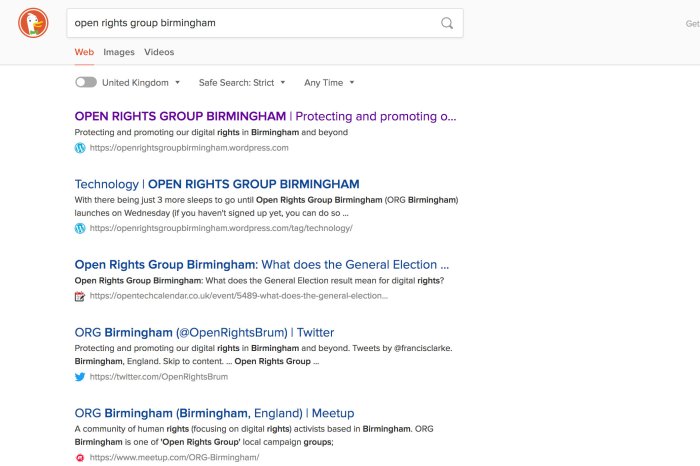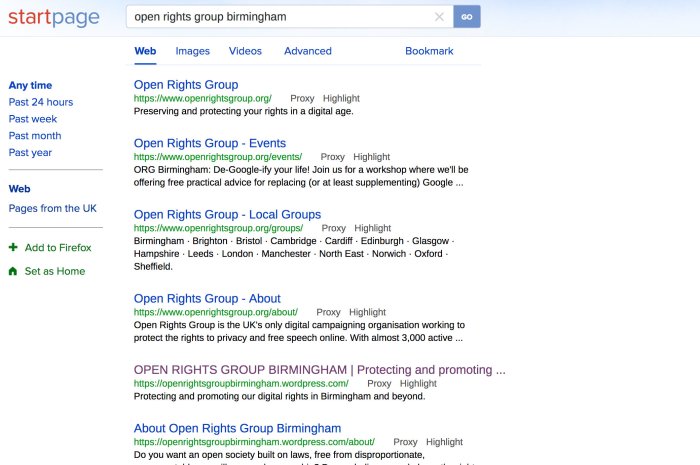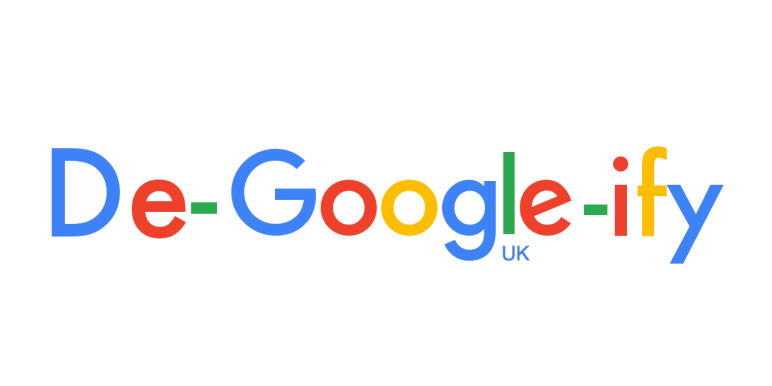Thank you to everyone who took part in our meetup last month at Birmingham Open Media. This post aims to capture the main points of advice we gave about alternatives to using Google for search. We’ll be sharing more tips about alternatives to other everyday Google services in future posts.

Why De-Google-ify?
Most of us recognise the power Google, Facebook, and other internet giants have over our daily lives. Chances are, you’ve been freaked out by just how much Google knows about you (and everyone else for that matter) and what this means for our society as a whole.
For a more detailed look at the issue Google poses for competition, privacy, security, and freedom of expression, please check out our recent post on why you should De-Google-ify your life.
Alternatives to Google search
Google has become synonymous with search, so much so that don’t search for something, we “Google it”. Google is the market leader when it comes to search, but there are good reasons to be concerned about how much you’ve come to rely on the services.
While most Google services are ‘free’, we pay with them through the sensitive data we divulge. Even in Incognito mode, Google’s own Your Data web page acknowledges it records and stores everything you’ve searched for and visited, and ties this back to you.
It’s unclear how long Google keeps hold of your search history for but, given the lack of clarity over this in Google’s current privacy policy, it’s probably safe to assume they hold onto your data basically forever.
Given all of this, what can you do if you don’t want Google to know everything about you?
DuckDuckGo

DuckDuckGo markets itself as “The search engine that doesn’t track you”. Unlike Google, DuckDuckGo’s privacy policy is refreshingly straightforward, stating plainly:
“DuckDuckGo does not collect or share personal information”
Unlike Google, which stores your search history to create a detailed picture about you, when you use DuckDuckGo the company has no way of knowing who you are and linking your searches together.
DuckDuckGo’s privacy credentials haved been given a boost by the Tor project, which in 2016 made it the default search engine for the Tor browser. For more information about what Tor is and how it works, watch the video below.
The downside to DuckDuckGo not ruthlessly harvesting your personal data is sometimes the search results you get aren’t quite as immediately helpful as Google and you’ll need to further refine your search in order to find what you’re looking for.
Luckily, DuckDuckGo does still allow you to search Google when you need to. Bangs, named after the American term for exclamation marks(!), allow you to directly search thousands of websites from DuckDuckGo, including Google. Typing in !googleuk followed by your search term will take you directly to the search results. Bangs can also be used to search Wikipedia, Reddit and thousands of other websites.
StartPage

While DuckDuckGo is improving all the time, what can you do if you really can’t bring yourself to give up on the convenience of Google search results? StartPage web search just might be for you.
Like DuckDuckGo (and unlike Google), StartPage aims to avoid collecting or storing any personal information when you use the service. Its privacy policy states: “StartPage does not collect or share personal information. We don’t track or profile you.”
StartPage acts as an intermediary, anonymously submitting your search query to Google and returns the familiar Google results, minus the tracking. StartPage still makes its money through advertising, but the targeting is limited to the topics you are searching for and the company is not building a gigantic trove of personal information.
While StartPage offers real privacy benefits over regular Google, by using the service you are still supporting the Google beast. Depending on how you feel about that, you may prefer to back upstarts like DuckDuckGo, which represent a cleaner break from the internet giant.

Hi Org. Thanks for mentioning StartPage.com for search privacy. Please note that StartPage also offers a free proxy with every search that allows users to view links in privacy, too.
Concerned citizens may also want to de-Yahoo their lives since Yahoo was caught assisting the US government and failed to protect millions of users from hackers. See: https://www.startpage.com/blog/ixquick/how-the-yahoo-hack-impacts-you-even-if-you-dont-have-a-yahoo-account-and-how-to-get-safe-again/
Note that DuckDuckGo brings its users private Yahoo/Bing search results.
Bottom line: StartPage.com and DuckDuckGo offer more private ways to use popular search engines while protecting your privacy.
LikeLike